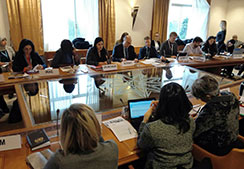Roundtable on ‘Accountability in Humanitarian Action: A Focus on Gender Dimensions’
Date:
The Permanent Mission of Norway to the United Nations and UN Women jointly hosted a high-level roundtable discussion on ‘Accountability in Humanitarian Action: A Focus on Gender Dimensions’ in Geneva on Friday, 26 January, 2018.

The meeting was attended by Ambassadors and Representatives from Australia, Canada, Colombia, Denmark, European Union, Finland, Germany, Iraq, Italy, Nigeria, Norway, South Korea, Sweden, Switzerland, Turkey, and the United States, as well as representatives from UN agencies and IASC members and Standing Invitees, including CARE, IFRC, IOM, SCHR, UN OCHA, UNHCR, UNDP, TPPF, FAO, OIC, OHCHR, Women @ the Table, WHO, and Inclusive Peace and Transitional Initiative. The objective of the Roundtable meeting was to discuss how to improve accountability in addressing gender equality issues in humanitarian action, especially in view of the current gaps between policy commitments and actual implementation. The meeting was chaired by Ms. Qasas, Chief of Crisis Preparedness, Prevention and Response at UN Women in Geneva.
In his opening remarks, Ambassador Hans Brattskar, Permanent Representative of Norway to the United Nations, reiterated Norway’s long-standing commitment to gender equality and pointed out that investment in gender equality is not only a right, but also a smart socio-economic investment. He further remarked while principles and commitments to gender equality are important, collective efforts need to transfer these into results on the ground in order to alleviate suffering for those in need. He welcomed the updated IASC Gender Policy and the accompanying IASC Gender Accountability Framework, and called upon everyone’s shared responsibility to help that this Accountability Framework leads to increased accountability on gender equality in humanitarian action.
Ms. Qasas, in her opening remarks, called upon practitioners to take a critical look at where they have been accountable, and where they have succeeded and failed. She remarked that a common threat to the challenges is that women and girls are exposed to risk in a different way than men. These structural inequalities result in different impacts of crisis on women and girls. Ms. Qasas further pointed out, that we do not yet appropriately respond to the different needs of women and girls. She provided humanitarian plans and strategies as examples, many of which are not yet gender-responsive.
The Deputy Permanent Representative of Canada, Katherine Godin, emphasized Canada’s commitment to gender equality, especially through its Feminist International Assistance Policy, which calls for gender-responsive humanitarian action. She further remarked that the delegation of gender mainstreaming to gender experts only is not the meaning of mainstreaming. Gender mainstreaming requires humanitarian leaders to embrace gender equality in their actions. She requested that partners include gender as a priority in field operations, and strive towards senior level accountabilities.
Izeduwa Derex-Briggs, UN Women Regional Director for Eastern and Southern Africa, reiterated experiences from the field, which show a continuing lack of focus on gender issues in humanitarian responses, while UN Women is often not part of the Humanitarian Country Teams. As in the example from South Sudan, the absence of UN Women in humanitarian planning processes made it more difficult to get gender issues integrated into humanitarian planning.
The Representative from CARE, Gareth Price-Jones said that in order to understand women’s needs and provide them a platform for input, it needs to be understood first how they can participate. Means of participation and practical tools on the ground need to be developed, and governments need to be encouraged to be more cooperative on gender issues.
Caroline Rusten from UN Women pointed out that gender is not yet sufficiently taken up by the IASC leadership and the role of the IASC Gender Reference Group is unclear, and while UN Women is asked to coordinate gender across the community, it is not a member of the IASC. This translates into the fact, that UN women at country level often does not sit on the HCT, and the gender issue is left out in humanitarian coordination. She stressed the importance of the endorsement of the updated IASC Gender Policy and Accountability Framework, but remarked that leadership at the highest level will be required to translate it into reality. She also mentioned the new Secretary General Report on ‘Repositioning the United Nations Development system to deliver on the 2030 Agenda’, and the excellent opportunity it provides to reform current structures around gender equality, including, a better integration of gender across the humanitarian – development and peace nexus.
In her concluding remarks, Ms. Qasas emphasized that we need to look at prevention, and build resistance in humanitarian crisis, and that UN Women needs to move from its focus on minimum standards to transformative change towards gender equality.
In his concluding remarks, the Ambassador of Norway said that there is a need for benchmarks on gender equality and for measuring progress, and that we have to be accountable – including being accountable to each other. He called upon the participants to keep ambitious targets on gender equality.